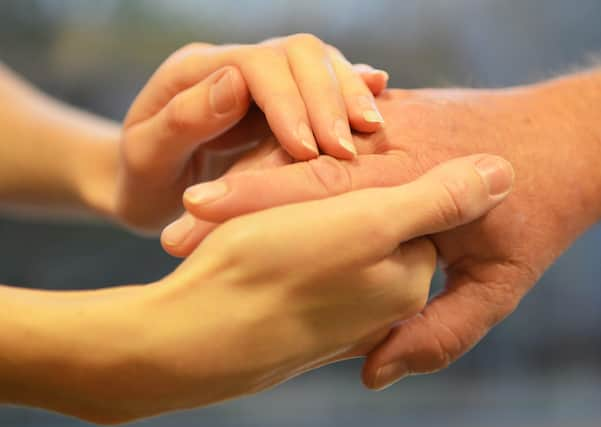How lockdown has added to challenges facing Sheffield’s young carers


When the Prime Minister announced strict lockdown measures to help curb the spread of the coronavirus back in March, Sheffield Young Carers says only a third of the young people it supports had the right digital equipment to be able to do schoolwork from home.
One family did not even have paper and pens to write and draw with.
Advertisement
Hide AdAdvertisement
Hide AdThe charity, which supports more than 100 young carers across the city at any one time, has been working to tackle isolation and digital poverty.
It supports those young carers aged eight to 25, who help to look after someone at home who has a disability, illness, mental health condition or drug or alcohol problem.
Lockdown is having a “real impact” on these children and young people, it says. Many are unable to take a break from their caring roles and they are missing out on the distraction that school provides, whilst access to other services has also been reduced.
“Many parents have been worrying about their children’s education, but for young carers who spend every day supporting an ill or disabled family member at home, school provides much more than a formal education,” a spokesperson for the charity says.
Advertisement
Hide AdAdvertisement
Hide Ad“School is a distraction which provides respite from their daily caring responsibilities; it’s a chance to see friends and to do things other young people do.”
A young carer in Year 12, who wished to be named only as Sara, helps care for her older sister.
“Before the lockdown, I had school,” she says. “I could go to school and take my mind off everything.”
The charity, which also provides training on young carers to GPs and teachers, says that whilst young carers are one of the groups still able to go to school, many feel too scared to do so in case they bring coronavirus back home, where, in many cases, family members have high risk conditions.
Advertisement
Hide AdAdvertisement
Hide AdSara’s older sister has epilepsy and tuberous sclerosis which causes tumours around her body.
Her family have been particularly careful about going out of the house and, as her sister’s carer, Sara, 17, feels she has been under a lot of mental strain.
“You always have in your mind that something could go wrong,” she says. “It makes you on edge all the time.”
For families on low incomes, Sheffield Young Carers says there have also been additional challenges.
Advertisement
Hide AdAdvertisement
Hide AdIt claims a delay in receiving Government school meal vouchers left some unable to afford enough food.
“The delay led to school staff driving round delivering emergency food parcels to some families and Sheffield Young Carers referring others to foodbanks,” a spokesperson says.
“In addition, many young carers in Sheffield have struggled with a lack of digital access.
“Some families with several children have been trying to manage school work on a single mobile phone.
Advertisement
Hide AdAdvertisement
Hide Ad“Having little or no digital access has also compounded young carers’ isolation from their friends.”
To help address the issue of ‘digital poverty’, the Paul Hamlyn Foundation, one of the UK’s largest independent grant-giving organisations, supplied Sheffield Young Carers with an emergency fund.
With this money and help from Sheffield technology company Millgate, it was able to equip 30 young people with the laptops and mobile wifi access to do their schoolwork and stay connected with family and friends.
The charity, established in 1997, is also continuing to provide young people and families with remote support by text, phone and group video chats, as well as linking them to other services, many of which are only currently offering support virtually, online.
Visit www.sheffieldyoungcarers.org.uk
Advertisement
Hide AdAdvertisement
Hide AdEditor’s note: first and foremost - and rarely have I written down these words with more sincerity - I hope this finds you well.
Almost certainly you are here because you value the quality and the integrity of the journalism produced by The Yorkshire Post’s journalists - almost all of which live alongside you in Yorkshire, spending the wages they earn with Yorkshire businesses - who last year took this title to the industry watchdog’s Most Trusted Newspaper in Britain accolade.
And that is why I must make an urgent request of you: as advertising revenue declines, your support becomes evermore crucial to the maintenance of the journalistic standards expected of The Yorkshire Post. If you can, safely, please buy a paper or take up a subscription. We want to continue to make you proud of Yorkshire’s National Newspaper but we are going to need your help.
Postal subscription copies can be ordered by calling 0330 4030066 or by emailing [email protected]. Vouchers, to be exchanged at retail sales outlets - our newsagents need you, too - can be subscribed to by contacting subscriptions on 0330 1235950 or by visiting www.localsubsplus.co.uk where you should select The Yorkshire Post from the list of titles available.
Advertisement
Hide AdAdvertisement
Hide AdIf you want to help right now, download our tablet app from the App / Play Stores. Every contribution you make helps to provide this county with the best regional journalism in the country.
Sincerely. Thank you.
James Mitchinson
Editor